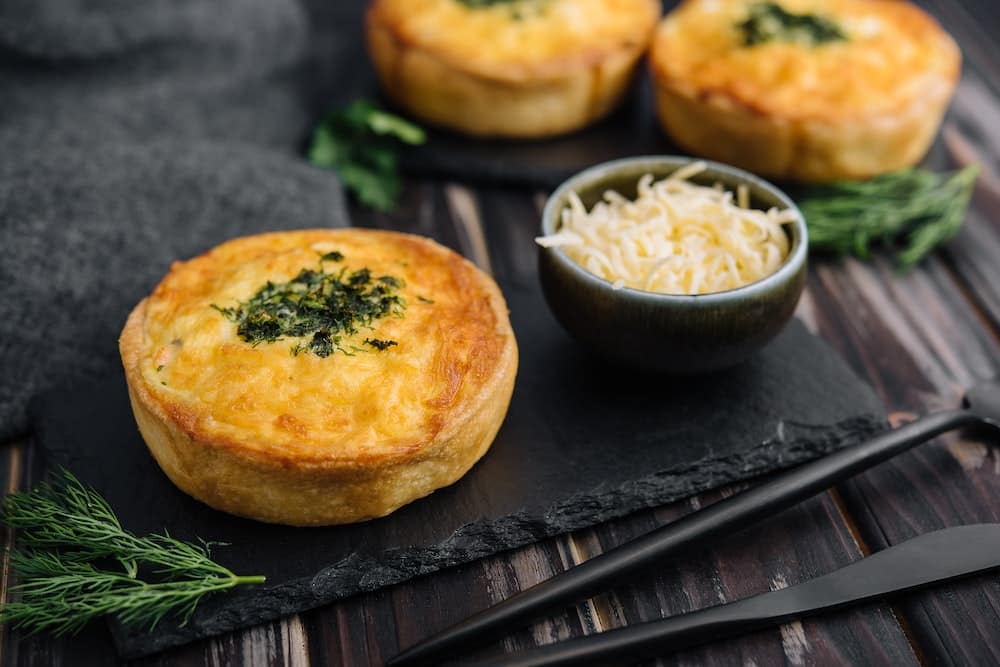Can You Bake a Gourmet Quiche Lorraine with a Buttery Crust?

Welcome to a culinary journey that will surely tantalize your taste buds! If you’re here, it means one thing: you’re ready to step into the world of baking and whip up a gourmet Quiche Lorraine with a buttery crust. This French classic, famous worldwide, is a testament to the magic of simple ingredients transformed into a flavorful dish. So dust off your apron, tie on your chef’s hat, and let’s get cooking!
The Story Behind the Quiche Lorraine
Every great recipe has a story behind it. The origins of the Quiche Lorraine take us back to the beautiful region of Lorraine, in northeastern France. This dish, initially a humble pie made by farmers, has evolved over the years into a gourmet delight enjoyed everywhere from high-end restaurants to family get-togethers.
A lire également : What Are the Secrets to a Perfectly Crispy Fish and Chips?
A traditional Quiche Lorraine is a savory open tart filled with a mixture of cream, eggs, and lardons – smoked bacon cut into small strips. Over time, variations have emerged, with different ingredients like cheese, vegetables, or seafood. But today, we’re focusing on the classic version, adding our touch with a buttery crust.
Preparing the Buttery Crust
The crust is the foundation of your quiche, and making it from scratch will elevate your dish to a whole new level. This is where the buttery magic happens. When selecting your butter, opt for a high-quality, unsalted variety. This will allow you to control the salt content and create a crust that’s tender, flaky, and full of flavor.
A lire également : How Can You Create a Classic French Ratatouille That Impresses?
Here’s how to prepare your crust:
- Combine two cups of all-purpose flour with a teaspoon of salt.
- Add in one cup of cold, diced butter and mix until the mixture resembles coarse crumbs.
- Gradually add ice water, a tablespoon at a time, until the dough comes together.
- Shape the dough into a disk, wrap in cling wrap and refrigerate for at least an hour.
After chilling, roll out your dough on a lightly floured surface and fit it into your pie dish. Remember to press it evenly into the edges to ensure a uniform bake.
Crafting the Quiche Filling
The filling is the heart of your Quiche Lorraine. A good filling is creamy, rich, and bursting with flavor. Start with fresh, quality ingredients. For a traditional Quiche Lorraine, you’ll need heavy cream, eggs, and lardons.
To make the filling:
- Preheat your oven to 375°F (190°C).
- In a bowl, whisk together four large eggs, two cups of heavy cream, a pinch of nutmeg, and salt and pepper to taste.
- In a skillet, cook your lardons until they’re crispy. Drain them on paper towels and let them cool slightly.
Sprinkle the lardons evenly over your prepared crust, then pour over the egg and cream mixture.
Baking Your Gourmet Quiche Lorraine
Once your quiche is assembled, it’s time to bake it. The secret to a perfect quiche is baking it low and slow, allowing the filling to set and the crust to turn a beautiful golden brown.
- Bake your quiche in the preheated oven for about 50 minutes, or until the filling is set and the crust is golden.
- If the crust starts to brown too much before the filling is set, you can protect it by covering the edges with some aluminum foil.
Serving Your Quiche Lorraine
Once your quiche is baked, let it cool for a few minutes before slicing. This helps the filling set and makes for easier slicing. To serve, cut into wedges and serve warm or at room temperature.
A gourmet Quiche Lorraine is versatile and can be served at any meal. Pair it with a green salad for a light lunch or dinner, or serve it with fresh fruit for a classy brunch. With your homemade buttery crust and creamy filling, you’re serving up a slice of French culinary tradition right at home.
Baking a gourmet Quiche Lorraine with a buttery crust is a gratifying experience. It’s a journey that takes you from mixing simple ingredients to creating a mouthwatering dish. And the best part? You get to share this delicious masterpiece with others – nothing brings people together like good food. So go ahead, embrace the joy of baking, and discover the rewards of creating your gourmet Quiche Lorraine!
Troubleshooting Common Quiche Lorraine Problems
Every baking journey has its bumps in the road, but fear not—most hiccups are easy to fix. Let’s go over some common problems you might encounter while baking your Quiche Lorraine and share some pro tips to overcome them.
Crust too hard: If your crust ends up too hard, it might be because you overworked the dough. Remember, the key to a tender, flaky crust is to handle the dough as little as possible. Overworking develops gluten, which can make your crust tough. Also, make sure your water is ice cold when making the dough. Cold water prevents the butter from melting, which helps create the flaky texture we’re looking for.
Filling is too watery: If your quiche filling turns out too watery, it’s likely you’ve either added too much milk or cream or not enough eggs. The egg to cream ratio is essential in setting the filling. Stick to the recipe’s recommended amounts to guarantee a perfectly creamy consistency.
Quiche is browning too quickly: If your quiche is browning too quickly, don’t panic. Simply cover it loosely with a piece of aluminum foil. This will deflect the oven’s heat and slow down the browning process, allowing your quiche to bake evenly without burning.
Quiche is undercooked: If your quiche is still jiggly in the center after the recommended baking time, it’s undercooked. But don’t worry, just keep baking it and check every five minutes until the center is set. Remember, ovens vary, and sometimes you may need to adjust the baking time.
Conclusion: Mastering the Art of Quiche Lorraine
Baking a gourmet Quiche Lorraine with a buttery crust is more than just following a recipe—it’s an art. It’s about understanding the intricacies of each ingredient, learning to balance flavors, and mastering techniques that have been passed down through generations.
Along the way, you’ll encounter challenges, but remember, practice makes perfect. With each quiche you bake, you’ll notice improvements—your crust will become flakier, your filling creamier, and your confidence will grow.
But perhaps the real beauty of baking lies not in the perfect quiche but in the joy it brings. The smell of baking crust filling your kitchen, the satisfaction of seeing your quiche come out of the oven perfectly golden, and the pleasure of sharing your creation with others.
So, whether you’re a seasoned baker or just starting, don’t be intimidated. Embrace the process, learn from your mistakes, and most importantly, have fun. After all, every quiche is a masterpiece, and you’re the artist. Here’s to your culinary adventure and the many gourmet Quiche Lorraine’s you’ll bake!
